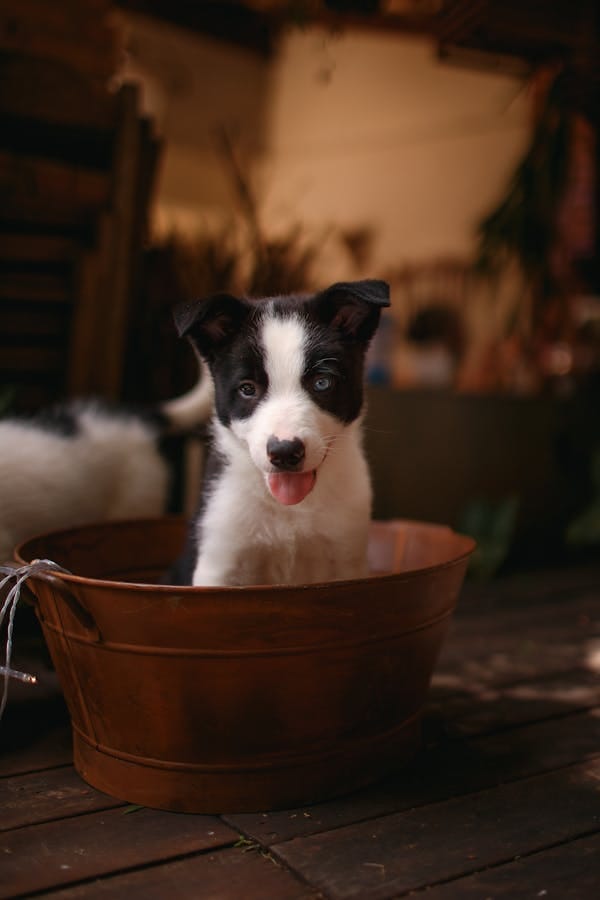
Welcome to the wonderful world of puppy parenthood!
Raising a furry friend is a rewarding experience, but it also comes with its own set of challenges.
One of the most important aspects of raising a puppy is establishing a routine.
A consistent routine helps your pup feel secure, promotes good behavior, and ensures they receive the proper care and attention they need.
In this blog post, we will discuss the benefits of a puppy routine, the key elements of a puppy routine, and tips for success.
Benefits of a Puppy Routine
Establishing a routine for your puppy brings a host of benefits, both for you and your furry friend.
Let’s delve deeper into why having a puppy routine is so beneficial.
Promotes good behavior
Picture your puppy like a little sponge, soaking up everything around them.
When they have a consistent routine, they know what to expect, which reduces confusion and stress.
This clarity helps them understand what behaviors are rewarded and which ones are discouraged, leading to better behavior overall.
Enhances training
Think of routine as the backbone of training.
When your puppy knows what comes next in their day, it’s easier for them to grasp new commands and behaviors.
Repetition is key in learning, and a routine provides ample practice opportunities, reinforcing training concepts effectively.
Improves physical and mental health
Just like us, puppies thrive on the routine for their well-being.
A set schedule ensures they get the right amount of exercise, sleep, and mental stimulation.
Regular exercise not only keeps their bodies fit but also releases pent-up energy, reducing the likelihood of destructive behaviors born out of boredom.
Strengthens the bond between you and your puppy
Spending quality time together is the glue that binds you and your pup.
A routine that includes playtime, walks, and positive reinforcement creates moments of joy and connection.
These interactions build trust and deepen your friendship, laying the foundation for a strong bond.
Socialization
Introducing your puppy to different experiences is crucial for their social development.
A routine that includes exposure to various scents, sounds, and environments helps them feel more comfortable and confident in new situations.
This confidence makes them happier and more well-adjusted companions.
Maintains a healthy weight
Obesity is as much a concern for dogs as it is for humans.
Regular exercise, provided by a structured routine of walks and playtime, keeps your puppy at a healthy weight.
This not only prevents weight-related health issues but also promotes overall vitality and longevity.

The Key Elements of a Puppy Routine
Crafting a solid puppy routine involves paying attention to several key elements, each crucial for your pup’s well-being and development.
Let’s break down these elements in detail:
Feeding
Providing your puppy with nutritious meals is vital for their growth and health.
Most puppies thrive on three meals a day, spaced evenly throughout the day.
Consistency in mealtimes helps regulate their digestive system and prevents issues like upset stomachs.
Opt for high-quality puppy food that meets their nutritional needs, considering factors like age, size, and any dietary restrictions they may have.
Portion control is essential to prevent overeating, which can lead to obesity—a common health concern in dogs.
Potty breaks
Puppies have tiny bladders and need frequent bathroom breaks—typically every 2-4 hours, especially after meals and before bedtime.
Establishing a routine for potty breaks helps prevent accidents indoors and reinforces good bathroom habits.
When your puppy successfully goes potty outside, lavish them with praise and rewards to reinforce the behavior positively.
Implement strategies to prevent accidents indoors, such as keeping your pup confined to a small area when unsupervised.
Sleep and naps
Just like human babies, puppies need plenty of sleep to support their rapid growth and development.
On average, puppies require 18-20 hours of sleep per day.
Designate a comfortable and safe sleep space for your pup, such as a crate or playpen, where they can rest undisturbed.
Encourage naps throughout the day to ensure they get enough rest to recharge their energy levels.
Playtime and exercise
Playtime isn’t just fun for puppies—it’s also essential for their physical and mental well-being.
Schedule regular playtime sessions throughout the day to provide stimulation and exercise.
Choose toys and activities that are suitable for your pup’s age and breed, ensuring they are both safe and engaging.
As your puppy grows, gradually increase the intensity and duration of exercise to support their developing muscles and coordination, while also preventing injuries.

Tips for Success
Achieving success in establishing a routine for your puppy requires a few key strategies:
Consistency is key
Stick to your routine as much as possible.
Consistency helps your puppy understand what to expect, which in turn fosters a sense of security and stability.
Whether it’s meal times, potty breaks, or play sessions, keeping a consistent schedule reinforces positive behaviors and reduces confusion.
Practice patience
Building a routine doesn’t happen overnight.
It takes time for your puppy to adapt and learn the ropes.
Be patient with your furry friend and yourself as you navigate this process together.
Remember, consistency and patience go hand in hand when it comes to training and routine establishment.
Flexibility matters
While consistency is crucial, so is flexibility.
Understand that your puppy’s needs will evolve as they grow and develop.
Be open to adjusting your routine accordingly to accommodate these changes.
Whether it’s increasing exercise time, altering meal schedules, or modifying potty break frequencies, staying adaptable ensures your routine remains effective and relevant.
Harness the power of positive reinforcement
Positive reinforcement is a powerful tool in training your puppy and solidifying routine behaviors.
When your pup successfully follows the routine, such as going potty outside, shower them with praise and treats.
This positive feedback reinforces the desired behavior, making it more likely to be repeated in the future.
Seek professional guidance when needed
Sometimes, despite your best efforts, establishing a routine can be challenging.
In such cases, don’t hesitate to seek help from professionals.
Veterinarians and certified dog trainers can offer valuable insights and tailored advice to address specific issues you may encounter.
Whether it’s troubleshooting potty training setbacks or refining your training techniques, professional guidance can make a world of difference.

Conclusion
Establishing a puppy routine is essential for their overall well-being and happiness.
By providing a consistent feeding schedule, potty breaks, sleep opportunities, and playtime, you can help your puppy thrive in their new home.
Remember, patience and consistency are key, and don’t hesitate to seek professional help if needed.


GIPHY App Key not set. Please check settings